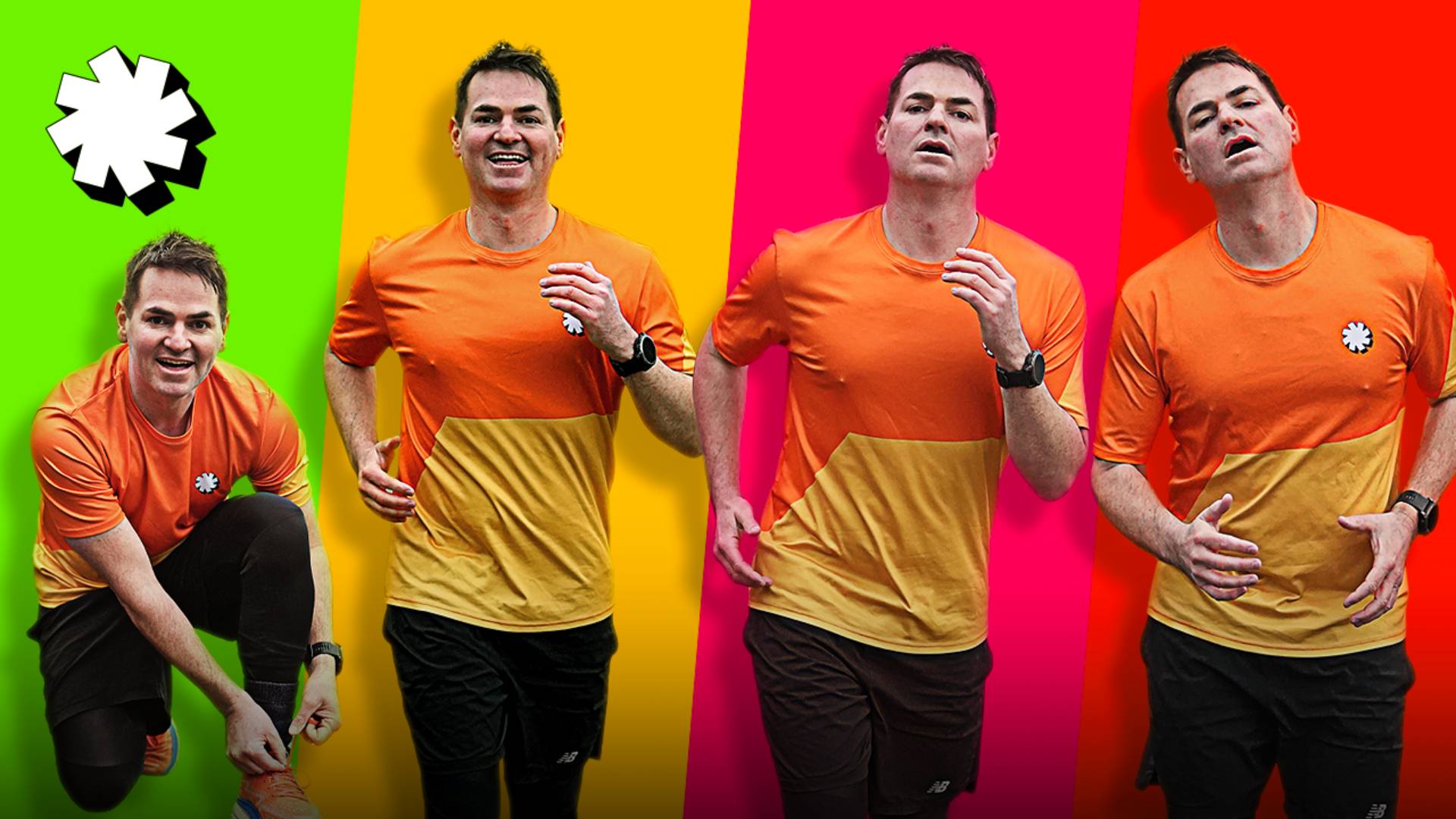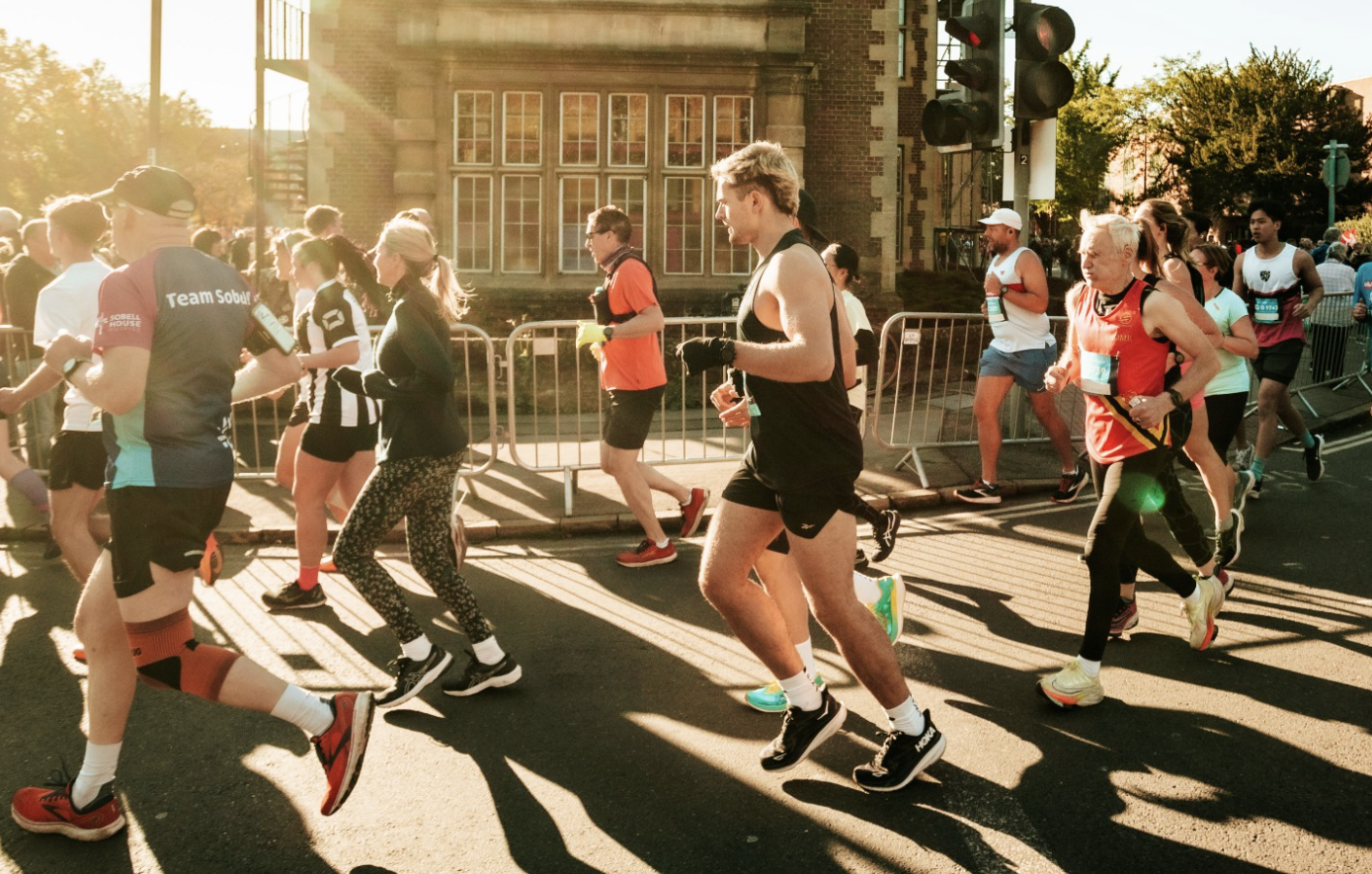How Runners Can Improve Their Mental Strength

As runners, we train our legs, our lungs and our heart – and we also need to train our brain.
Working on mental resilience is something that every runner can do, and there are tips and techniques we can use to improve our mental strength in our training.
WHY TRAIN YOUR BRAIN FOR RUNNING SUCCESS?
Mental resilience, mental toughness, mental strength. It all means that we’re working on our psychological fitness as well as our physical fitness.
It involves using different techniques to help us prepare to succeed and to overcome any challenges we face.
WHEN DO YOU NEED MENTAL TOUGHNESS AS A RUNNER
- When you lack motivation to go for a run
- When you’re early in a training block and your goal feels too difficult
- When a run or workout feels challenging and you want to quit
- When you suffer from an injury and need to take time off
- When you decide you need to rest instead of run (because us runners love to run and hate to take days off!)
- When the weather is bad and you don’t want to go outside
- Before a race as you prepare to start
- During a race as it gets tough
- After a run or race when you take time to analyse how it went to learn how to progress
TIPS ON HOW TO IMPROVE MENTAL STRENGTH
The tips below are all about building mental strength and resilience in your running, and we’re specifically focused on your training and preparing for race day. We’ll talk all about race day in another article.
POSITIVITY IS POWERFUL
“I can’t do this” is a very powerful thing to think during training or in a race. Say it over and over and it’s like you’re pushing harder and harder on a brake pedal that’ll eventually make you stop.
Using positive self-talk is a wonderful way to boost your performance, especially if you’re struggling. Research suggests that we should talk to ourselves as if talking to someone else, so saying: ‘You got this!’ or ‘You are amazing!’ is better than ‘I got this!’.
Other research shows that mental fatigue decreases physical performance, and negativity is a big drain on how you’re feeling, leading to mental fatigue. Positivity helps us move forward.
Mantras are a part of this positive self-talk. Is there something that you can repeat to yourself that is very meaningful to you? You don’t need to say it out loud, but it does need to be motivational for you. Some examples of mantras or positive talk include:
- Stay present
- Run the mile you’re in
- You are strong
- Smile!
- Be brave
- Pain is inevitable, suffering is optional
FIND REASONS, NOT EXCUSES
Instead of thinking about things which might stop you from running – it’s raining, I’m tired, I’m late – think about reasons to get out and run.
Rain makes me mentally tougher. Running will give me a great boost to my mood. A short run is better than no run. Every time you go for a run you’re working to improve your fitness and your mental health, and that’s a very good reason to lace up your shoes and go.
While we’re here, let’s talk about bad weather. Sure it sucks to start a run in the rain, but put on some old trainers, pull up your hood and get out there. You’re waterproof and you’ll dry off quickly once you’re done, plus you’ll feel great for having done the run and overcome the adversity (and adverse weather).
Plus you don’t know what weather you’ll get on race day. If you wake up and it’s pouring rain for your race, then if you’ve done training runs in the rain you’ll be much better prepared to succeed.
SET GOALS, BUT BE REALISTIC
Goals give us something to aim for. Make the goal something that scares you enough to make you work hard for it, but not something unrealistically hard. Attach a why to your goal; why do you really want to do this? It could be any reason as long as it’s meaningful and motivating for you. A goal plus a reason equals great motivation.
Part of mental toughness is the ability to be realistic and to adjust goals when we need to.
If you wanted to run 3:59 in a marathon but aren’t realistically fit enough to do that but still set out at that pace, then you’re going to have a really hard time in the race. Adjust the goal to 4:10, run positively and comfortably, and there’s always a chance you’ll feel good and can push on and get close to 4:00. That’s a much better experience than blowing up and finishing in 4:20.
FOCUS ON THE PRESENT
‘Run the mile you’re in’ is a great piece of advice. You can’t be running mile four worrying about whether you’ll hit the wall at mile 20, and you can’t be thinking about a long run that’s two months away when you’re just beginning your training block.
Run each mile, one at a time. Regularly check in with yourself to see how you’re doing: are you breathing OK, are you getting enough water and energy in, are you consistent in your pacing? Be present in your run.
Doing a form check can be a great way to focus on the present. Are you running with good cadence and foot strike? Are you running tall? Is your head up? This can be especially good near the end of a long run when your form naturally suffers – run tall and you’ll run more efficiently.
FAILURE DOESN’T MEAN THE END
This is something Jim Walmsley told us. Every time you fail, you learn and you can get back up and make the changes you need to in order to improve. Another way to think of it is to ‘fail forward’ meaning we make progress from failure, rather than letting it hold us back.
We never want to fail, whether in training, a race, or just in life, but it’s an important part of a growth mindset that lets us make the changes we need to be able to do better next time.
ACTION BRINGS CONFIDENCE
The best way to improve as a runner is to be consistent with your training. That doesn’t need to mean six runs a week with two hard workouts and a 20-mile long run. Just running three times a week, even if those runs or run-walks are 10-20 minutes each to begin with, is the very best way to get better and to improve your confidence.
Confidence helps us to feel mentally more capable and prepared. Doubts come when we aren’t confident enough in what we’re doing. You can expect a few doubts and fears early in a training block, but by being consistent in the first few weeks, we gain confidence that we can do it, because we are doing it and that’s a great way to improve your mental strength.

SMILE!
The great Eliud Kipchoge is known to smile to himself late in a race. He’s not doing that because he’s having a lovely time, he’s doing that because he’s struggling.
Research has shown that smiling can bring a physical and psychological boost to your running, improving your running economy and lowering your perceived effort. Try it next time you’re having a hard time during a run.
An alternative could be to save a funny podcast to listen to and laugh along on your long run.
IF THINGS GET TOUGH SAY F**K IT!
If smiling doesn’t work, then try swearing. There’s research to show that swearing during hard exercise can improve physical performance as it triggers a release of adrenaline and also increases your pain tolerance. F**k yeah!
DEVELOP A PRE-RUN RITUAL
This can be a series of things which help you feel prepared before a run. No matter the situation – first thing in the morning, taking a break from work, ahead of a race – if you can go through the same pre-run ritual and routine, then it can prime your mind to prepare to run.
Maybe it involves listening to a couple of songs which help you feel energised. It could involve a series of mobility exercises. Perhaps there are some motivational quotes or mantras you like to repeat to yourself. Whatever the ritual is, repeat it before every run and your brain will be one step ahead of your feet in being ready to go.
PUSH THROUGH DISCOMFORT
You can do hard things. Every time you do something challenging, or work through discomfort without quitting, it’s a powerful way to build mental resilience.
This could be running when you don’t want to, it could be running that final rep when you’re struggling, or going the full distance in your long run instead of taking a shortcut home. By overcoming the discomfort you’re going to feel a greater sense of accomplishment and it’s going to bulk up our mental strength by showing us that we are really capable of continuing through discomfort.
KNOW WHEN YOU HAVE TO STOP
While we’ve just said how good it can be to push through discomfort, it’s also important to listen to fatigue and take rest where needed to help you feel good for the next days of training.
Success in any training block means being able to consistently perform well in each run. If we struggle to do that, then it’s a sign we need some down time. If you’ve been feeling ill, if you have higher life stress than normal, if you’ve had bad sleep for a few days, then sometimes the best option is to focus on feeling better. Take the rest, come back stronger.
And then there are those niggles and injuries which we can’t ignore. Don’t run when injured. Rest, see a physio, do low-impact cardio instead. Don’t be stubborn and try to ‘run it off.’
Recognising when you need the rest is actually a great sign of mental resilience – because for a lot of runners, taking the extra day off is hard to do.
***
Here’s Sarah, Andy and Rick talking about mental toughness and running.
How do you work on your mental strength and resilience as a runner?




























Running News
Ingebrigtsen Stars at World Athletics Indoor Championships 2025 – Plus All The Winners!
Sam Ruthe Is First 15-Year-Old To Run A Four-Minute Mile!
Eliud Kipchoge Will Run The 2025 Sydney Marathon!